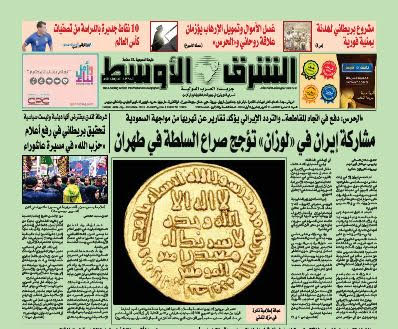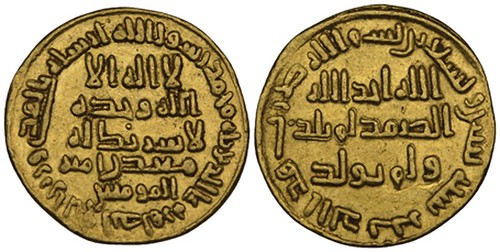
PREV ARTICLE
NEXT ARTICLE
FULL ISSUE
PREV FULL ISSUE
UMAYYAD DINAR FROM THE CALIPH'S MINE AUCTIONED An E-Sylum reader writes: One of my friends in London sent me this about a coin (lot 17 and on the cover) in an upcoming Morton and Eden October, 20th sale. They have told me that Al-Sharq al-Awsat is pretty much the main broadsheet newspaper in the Arabic-speaking world, and their cover coin is on the front page as well as inside the cultural section. As you can see from the catalogue description it is related to the Year 105 they sold in 2011 for just over $6 million (which remains the highest price ever for a non-US coin). Here's an excerpt from the auction lot description. -Editor
 Umayyad, dinar, Ma‘din Amir al-Mu’minin 92h, obv., in field: la ilaha illa | Allah wahdahu | la sharik lahu | Ma‘din Amir | al-Mu’minin; rev., standard Umayyad type with date legend in margin, point below b of duriba, 4.25g (SICA 10, 487, same obverse die; Bernardi 47), minor marks in reverse field but generally good very fine, historically important and extremely rare. Enigmatic, historically intriguing, and of the highest rarity, Umayyad dinars from the ‘Mine of the Commander of the Faithful’ have fascinated numismatists for more than a century. The circumstances under which they were issued are still the subject of scholarly debate, although recent research and newly published coins have advanced our knowledge considerably in recent years. Examples dated 89h, 92h and 105h have been sold in these rooms previously (the unique coin of 89h on 23 April 2012 and the other two dates on 4 April 2011). The phrase ‘Ma‘din Amir al-Mu’minin’ is found on two groups of gold coins. The earlier group, known for the years 89h, 91h and 92h and to which this coin belongs, carries these words in the obverse field below the normal inscriptions. On the later coins, known only for the year 105h, the phrase is expanded to read ‘Ma‘din Amir al-Mu’minin bi’l-Hijaz,’ ‘Mine of the Commander of the Faithful in the Hejaz,’ and is placed in the lower part of the reverse field. The significance of the Ma‘din inscription is still debated but, as has previously been argued, there is much to be said for the simplest explanation: that it refers to a mine belonging to the caliph. While the word ‘mine’ can be used metaphorically in Arabic, all other legends found on post-Reform Umayyad gold and silver coins are either religious (verses from the Qur’an) or factual (stating where and when the coin was struck). That being said, it seems difficult to treat it as a normal mint-name, which one would expect to find in the margin with the date, and for which there would certainly have been space to include there. It has also been observed that the mints on the Umayyad silver coinage were set up in cities, or perhaps at places where the army halted on campaign, but are not otherwise known to have been set up at a mine itself. To read the complete lot description, see: Here's a link to the English version of the newspaper article. -Editor
To read the complete article, see:  Wayne Homren, Editor The Numismatic Bibliomania Society is a non-profit organization promoting numismatic literature. See our web site at coinbooks.org. To submit items for publication in The E-Sylum, write to the Editor at this address: whomren@gmail.com To subscribe go to: https://my.binhost.com/lists/listinfo/esylum All Rights Reserved. NBS Home Page Contact the NBS webmaster 
|